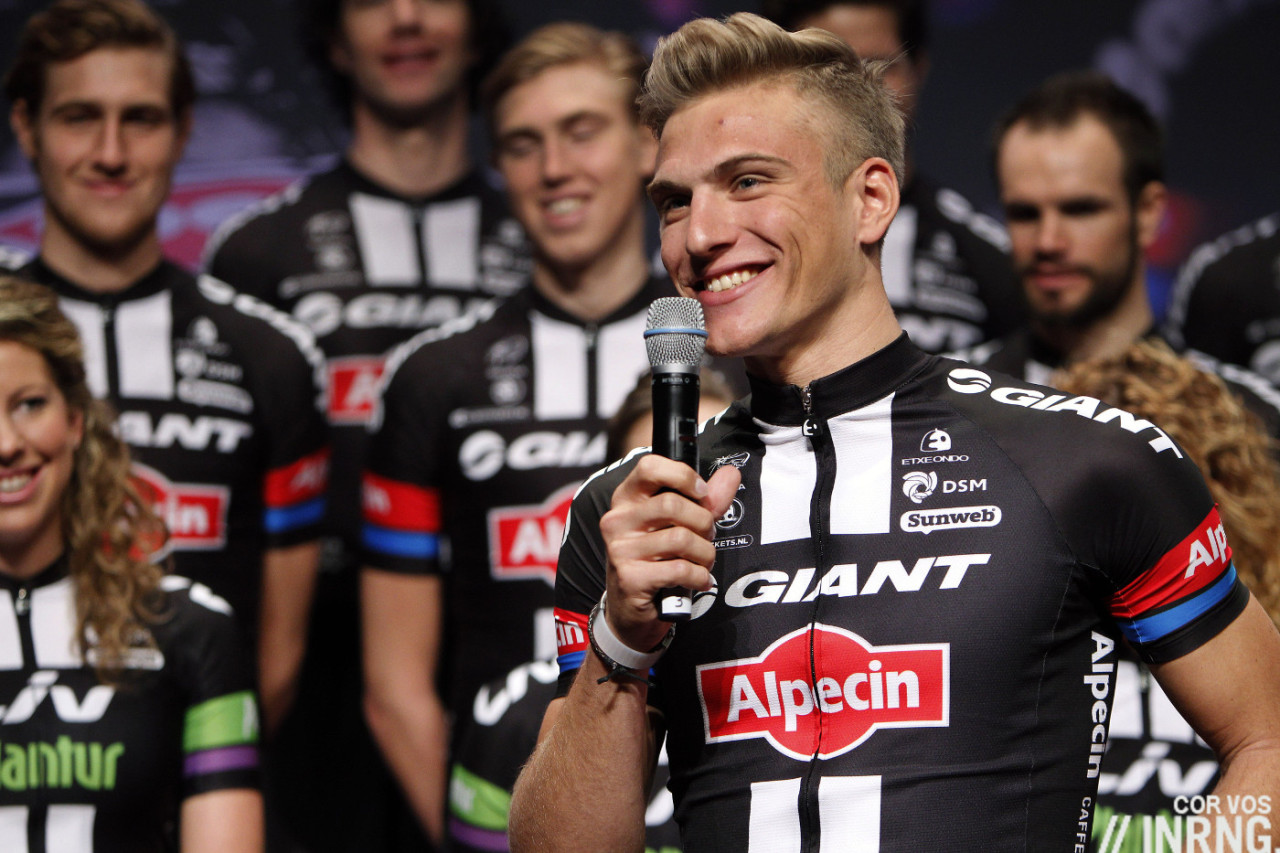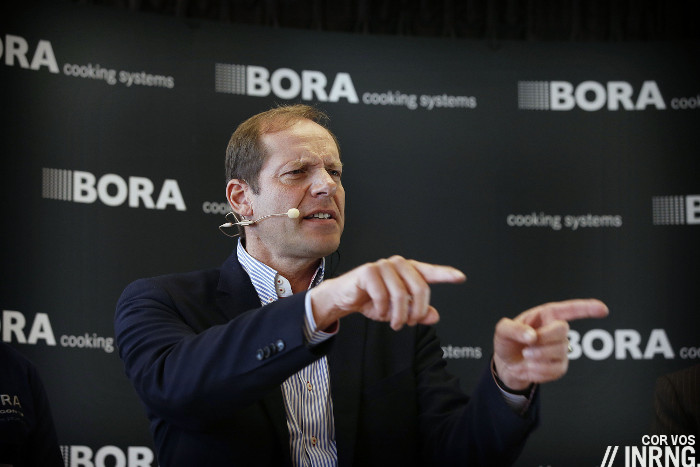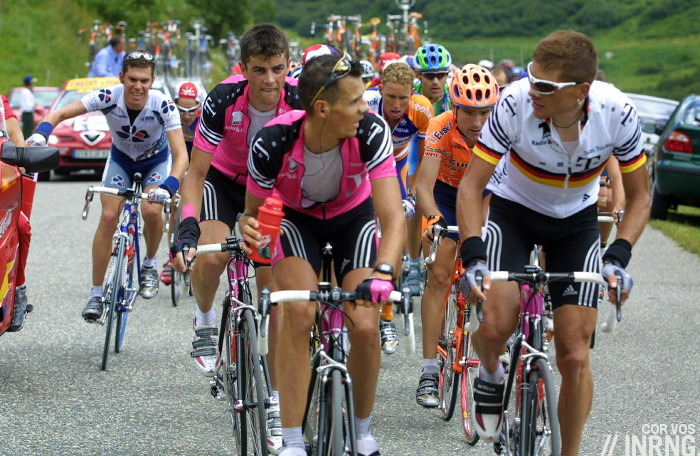
Giant-Alpecin launched the team for 2015 today. We know the sponsors, we know the riders, so what’s new? Well the location was telling, they used the French embassy in Berlin. While most teams book a hotel or a theatre this one went for the grandiose symbolism of diplomacy and Franco-German unity. This is about much more than bikes and shampoo.
Ten Year Journey
The team’s come a long way. You might remember the Skil-Shimano team which became Argos-Shimano but it was Shimano-Memory Corp to start with. The Skil format was a Pro Continental team on a tight budget, they tried hard to get a spot in the Tour de France, recruiting French riders and starting many a small race in France to establish their francophile credentials. It paid off in the sense they were invited for the 2009 Tour and it wasn’t until 2013 that they became a World Tour squad. Regardless of their UCI label now they seem essential to any race. Marcel Kittel is the king of the sprints but the roster is full of exciting riders.
It’s not been perfect, the team almost vanished when the squad ditched Dutch oil firm Argos for a US suitor who turned out to have empty pockets. Bike sponsor Giant had to step in to save the team. But otherwise it all seems a rather sustainable path and likeable too, they seem fun and healthy. Nobody worries about dodgy doctors here. Now things seem to be getting better still. After landing Alpecin last summer in recent days the team has announced a slew of subsidiary sponsors: Sunweb, Oakley, Pioneer and more. If you wanted a case study in how to build a team from small beginnings look no further than Iwan Spekenbrink’s journey to build this squad.
German multinational
“We’re multinational” said the squad today but they’re making a clear play on the German connection. The team will race under a German flag for 2015, it’s an elective decision under the UCI rules – teams are free to chose a nation – and makes impeccable commercial sense given Germany is Europe’s largest consumer market. Naturally a team will attract greater coverage in Germany if it’s German. But there’s authenticity behind the German label with Marcel Kittel and John Degenkolb as captains and Germany’s Alpecin as a co-sponsor. Still the team’s DNA remains Dutch with senior managers and nine riders, ahead of five German riders.

There’s also Bora-Argon 18. Nine months ago Ralph Denk might have been thoughtfully plotting a route for his team to become Germany’s only pro team and attract all the accompanying headlines but the plans have been overtaken by Giant-Alpecin’s germanic adoption. Still there is room for two teams and if they’re rivals we can celebrate two teams. A wildcard invitation for the Tour looks likely.
80 million people
Germany is the big market to crack. As covered here and elsewhere before cycling is a popular sport in Germany but TV coverage has vanished. The German public bought into the T-Mobile team only to discover many of their results were a monumental fraud and TV broadcasters took an editorial decision to pull live coverage of the race. This wasn’t Germany exceptionalism; even in France the establishment newspaper Le Monde also stopped reporting on the Tour de France for a while, reasoning that the race was no longer a sporting event but a pharmaceutical contest.
The return to normality stops the media blackhole for sponsorships, because until now funding a pro team meant reaching major European markets from France to Poland, Denmark to Switzerland only to exclude Germany, Europe’s largest and most wealthy nation.

New TV deal
German broadcaster ARD will show the Tour de France next summer. The Tour has been available on Eurosport and the channel, unlike almost everywhere else in Europe, is free-to-air to strictly speaking cycling has been visible but the difference is one of audience, Eurosport remains a niche broadcaster rather than a mainstream channel with giant audiences.
The reported €5 million for rights paid by ARD seems light, one third of the sum paid at the height of the Ullrich-mania. But what if live TV coverage in Germany on a prime channel like ARD is almost worth giving away for ASO? It can build an audience and there are immediate gains, it can now sell jersey space and other publicity like hoardings and banners knowing that they’ll be seen by millions in Germany. These are cautious steps, the live coverage only extends to 90 minutes a day and it’s for the Tour de France only. ASO’s other races like the Dauphiné, Paris-Roubaix, Liège-Bastogne-Liège and Paris-Nice remain on Eurosport only. Plus ARD has an option to pull out in the event of more doping scandals.
Conclusion
A team launch with a difference, Giant-Alpecin are an international team waving the German flag and on the same day we’ve had confirmation that the live daily coverage of the Tour de France will return to ARD in July. All good news.
It’s the start of a return to normality rather than the resolution of a long-standing problem, it’ll take more than Kittel’s caffeinated quiff to resolve. TV coverage on a mainstream channel is great but only the beginning as cycling audiences take time to build. There are immediate benefits, today is great for German cycling but good for the sport as a whole as existing teams and the Tour de France can reach a wider audience this year.

Thank you INRNG for the comprehensive overview. You might have added that the UCI have held extensive meetings with ARD over the doping problems of the sport. They appear to have convinced the broadcaster of their commitment to remove the spectra of doping from cycling.
Credit where credit is due for the UCI.
Good point, it seems Brian Cookson was talking to ARD too.
Thats a very fair point. We dish out brickbats all the time, and its only right we should give props when they’re earned.
Hats off: the phrase “Kittel’s caffeinated quiff ” won’t be topped soon.
I concur. Only a reference to Dekenkolb’s post-teenage bum fluff could outdo it
yes, but “three vans and a motorbike” is still inrngs best line ever.
Is this Alpecin, as in ‘Doping for Hair’ as endorsed by Jan Ullrich!
Yes, an unfortunate phrase but long time sponsor of cycling. As they pointed out in the presentation they’ve been sponsoring cycling for 50 years now. Those watching Eurosport’s TV coverage will have seen them sponsoring the TV coverage.
There’s a certain sense of poetic justice in the fact that Kittel is being sponsored by a hair products company.
Let’s not overlook the launch of their women’s team – Liv-Plantur. It is often said that World Tour teams should also have a women’s team and the Giant-Alpecin/Liv-Plantur model seems a great concept with both companies’ respective male/female brands being promoted.
Yes and nice to see the women’s team standing in front on the stage today with the men behind, a gesture but the main thing is two teams together.
Something for the weekend Sir?
I wonder if this might prompt the growth / resurgence of German equipment manufacturers in cycling. I know Focus is a big brand these days as is Canyon (I think it’s German anyway). There’s also Continental I suppose. However, instinct tells me that all the R&D that goes into making the German automobile industry world leaders in aerodynamics, engineering, carbon treatment etc is potentially missing a trick here.
e have more bikes on the streets than ever in Germaby, steadily growing. Bike sales weren’t touched at all by lack of ARD or ZDF coverage all the years. Opposite is true, they skyrocketed. Who wants to watch cycling goes to Eurosport and who wants to ride do so anyway. So what should change?
There’s plenty of cycling spin-offs from the R&D. The Carbonsports/Lightweight wheels, components, rims and frames from the likes of AX-Lightness, Schmolke, THM. There’s also SRM power meters and more, a thriving cycling industry behind Canyon and (Dutch-owned) Focus.
You could try to build a 100% Italian bike or nearly so if some Campagnolo parts are from Romania, you can also try to build a 100% German bike, off the top of my head the chain might be the only thing missing.
Connex is German:
http://www.connexchain.com/en/road-bike-chains.html
Looking down the road for the next couple of years. Who besides Tony Martin might have GC potential in a GT who is German?
Difficult question but Silvio Herklotz is being watched by many although he seems to have his limits in the high mountains.
Matt–enough with the hat jokes, already! just put a cap on it!
Othersteve–now that Jensie’s retired, there are no more German GC contenders. Yet, nonetheless, with several exceptional pros, like Kittel,German pro cycling certainly deserves the domestic TV coverage and ensuing sponsorship. Well done, indeed!
Jens was all, but no GC contender. Klödi was the last we had
Since the traditional cycling countries are too broke to do much, it’s great the Germans are stepping up now.
No one in Germany needs broadcasting of cycling from ARD. Just watch Eurosport.
Every second word will be related to doping. They only do that with cycling. No biathlon or soccer or any other sports. We used to have a great variety of sports on tv. Now we only have soccer and in winter biathlon. That is a shame.
Its a good job for the particular sports and associated events organisers, that there’s no similar get-out clause relating to doping in the case of athletics and biathlon, for starters.
I think it’s more about cycling needing the viewers than the other way around
Another team in a black jersey… Half the peloton looks “seriously” the same. We won’t be able to tell anyone from the helicopter? Why doesn’t the UCI regulate this?
Alpecin bottles are black so this fits with the corporate branding. Telling one team from another matters a lot, for fans of course but also riders on a rainy day need to see who is up the road. But for marketing, what counts is the headlines and the big TV coverage of the jersey crossing the line first, eg when Marcel Kittel sits up to celebrate and the others are left trailing there’s no need to tell the jerseys apart.
just root for tinkoff and astana wont be hard to spot :/
Astana will be easy to spot or very hard to spot: Either they take the shot across the bow seriously and will be shelled out the back or they continue business as usual and the UCI will finally decide to send them back to Kazakhstan.
Yaaaawwwwnnn
A sprinters’ team, banking on drafting and controlled, boring races. Very bad for the sport. I hope they fail and upset their sponsors. And that sprinters, as secondary players, have to join teams focused on GC, so that GC action can take place on flat stages, and not everything is made predictable by the presence of those “sprinters’ teams”.
You’re trolling again but Tom Dumoulin, Warren Barguil and others, plus Degenkolb in the classics mean they’re a lot more than a sprinter’s team. All teams try to control races, watching Sky set tempo in the mountains can be boring too.
With all due respect, let me object frontally to the trolling qualifier. I am negative about this team for clear reasons. The fact that no one else mentions them here makes them no less valid neither makes me a troll. Race organisers are more and more reluctant to include flat stages because of sprint-centered teams and that is bad and very telling. On the other hand, I’d love to see Dumoulin or Barguil ambushing and creating chaos on flat stages. But we will not see it happening if Kittel, Mezgec or even Degenkolb are around. And it’s a pity. I agree it’s boring to see Sky control climbs. So perhaps if König, Porte, Nieve or even Henao were given the salary and leadership Kittel (like Cipollini and Cavendish before in other structures) is getting at Giant-Alpecin, we would see less control and more battling. But the trend has been towards specialized teams. And that’s bad. Very bad. Whoever denies it is the very troll, in my quite humble opinion, if I may say.
To the contrary, don’t you think the teams’ diversified goals and structure adds to the complex tactics that makes cycling so different from other sports?
And are you sure it would be more entertaining if each team was structured similarly with defined and rigid roles? Don’t we all enjoy the stories and conspiracy theories about who’s helping who etc? In the end, cycling is the only sport (that i can think of) that one could argue is better read than seen anyway (hence the various publishers as organizers) and these overarching narratives often seems just as important in the “historymaking” than the actual riding itself.
And let us not forget that it was HTC that attacked on the flat in 2009 and got Armstrong those seconds on Contador, and it was Cavendish again who won in 2014 when Contador got away in the crosswinds. So I guess boring sprinting teams sometimes can be quite inventive?
Dunno if I’d call sprinter’s teams generally “bad for the sport”. Not everyone can contend for GC after all and some of the fast men turn out to be much more interesting characters than a lot of the GC guys. I think Super Mario, Manx Missile, this Kittel guy with his paint-brush haircut (does he have a good nickname yet?) make things more interesting rather than less. Bringing back that “fog of war” by ditching the radio earpieces might do much more to liven up flat stages than somehow forcing all the “sprinter’s teams” to have a GC contender as well?
Marcel “Death Ray” Kittel?
The 400-nanometre man?
Marcel “Dope, but no dope” Kittel?
Perhaps “The No-Doper Dope” is more pithy for the last one.
GC action in a flat stage? Yeah right. Last time that happened, the famous TDF 13 stage, it was opqs pulling for cav because kittel was caught behind that made it happen. Some of the gc contender teams helped but i doubt they would have succeeded without opqs.
Excellent post and discussion, spoilt only by accusing our host of being a troll. Whatever happened to courtesy? Without Inrng writng, we’d all be worse off. So thank you, Inrng.
Cycling is wonderfully diverse: sprinters, climbers, rouleurs – there’s something for everyone. Bring on more teams who invest in the sport and win. What’s boring for one can is tactically exciting for another.